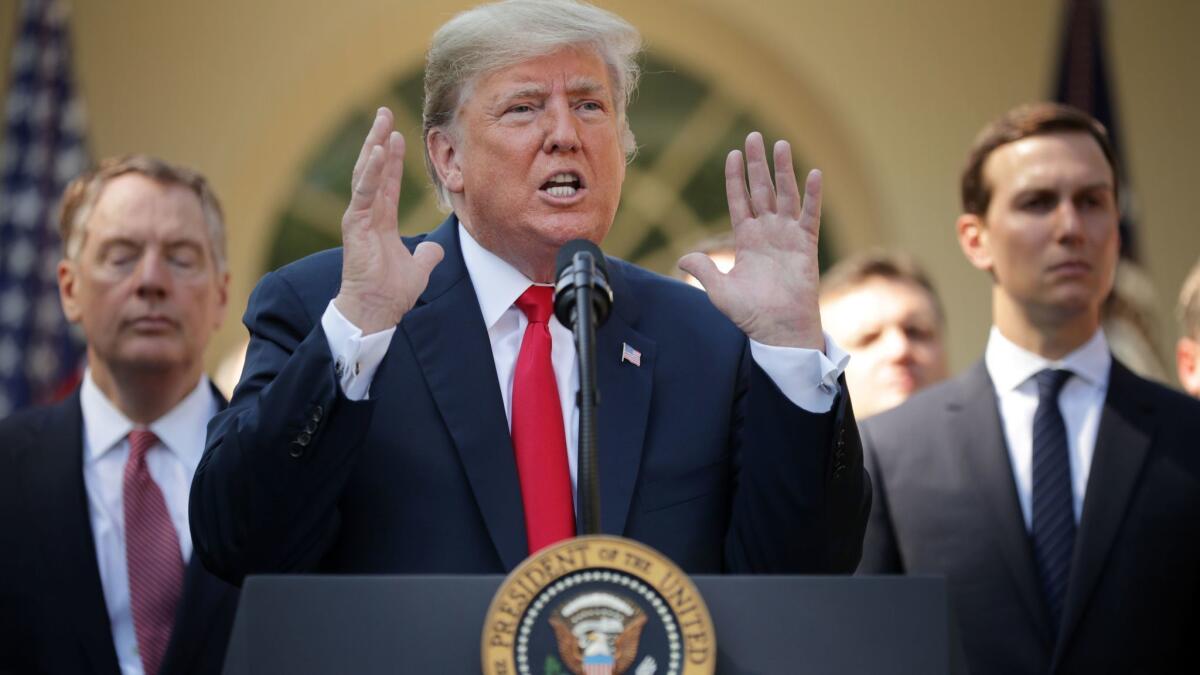Leading Democrat calls for changes in new trade deal with Canada and Mexico

- Share via
President Trump’s new trade deal with Canada and Mexico needs changes to secure support from Democrats, according to a senior House Democrat in line to play a leading role on trade policy in the new Congress.
There needs “to be not only changes in the legislation but more enforcement” if the Trump administration wants votes from Democrats, said Rep. Bill Pascrell Jr. of New Jersey, who is positioned to chair the Ways and Means trade subcommittee, in an interview on Wednesday.
Democrats’ concerns wouldn’t require a major rewrite of the deal and likely could be addressed by putting strong “enforcement mechanisms,” especially over labor and environmental rules, in the U.S. law that brings the deal into force, said Pascrell.
All three nations are preparing to sign the agreement during the Group of 20 leaders’ summit in Argentina taking place Nov. 30 and Dec. 1. The trade pact will require approval from the new U.S. Congress that convenes next year, and lawmakers in Mexico and Canada.
Pascrell’s comments underscore the new clout Democrats will wield, after the party seized control of the House of Representatives in last week’s midterm elections. Although the lawmaker didn’t outline specific changes to the deal his party is seeking, Democrats have been consistent in pushing for tougher labor provisions.
The new NAFTA includes a requirement that Mexico change its laws to bolster independent unions but Democrats and labor activists say the deal doesn’t contain adequate mechanisms to enforce the rules. Some labor activists argue that these concerns could be addressed in U.S. legislation — as proposed by Pascrell — rather than a wholesale reopening of negotiations with Mexico.
A spokesman for Canadian Foreign Minister Affairs Chrystia Freeland responded by citing comments the minister made earlier this week when she said each country must follow its own domestic procedure to ratify the deal.
“I think that it would be really presumptuous for me or the government of Canada to presume that we can get involved in the U.S. ratification process in the same way that I think we would consider it rather presumptuous for the U.S. to get involved in our own ratification process,” Freeland said in Windsor, Canada, on Tuesday.
The U.S., Canada and Mexico at the end of September reached a preliminary deal to update the North American Free Trade Agreement, which Trump had derided as a “disaster” that cost the U.S. jobs. Negotiators from the three countries worked around the clock to clinch an agreement so outgoing Mexican President Enrique Pena Nieto could sign it before his successor, Andres Manuel Lopez Obrador, takes office Dec. 1.
The new deal would be called the U.S.-Mexico-Canada Agreement, or USMCA. Business leaders welcomed the pact, which staved off the risk that Trump would withdraw from NAFTA, as he has repeatedly threatened. Still, Trump could give six months’ notice of U.S. withdrawal from NAFTA, which put pressure on Democrats to vote for the deal or let the trading bloc collapse.
The revised accord includes tighter regional content rules for cars built on the continent, as well as a provision that requires at least 40% of car production to come from factories where the average wage is $16 per hour. The U.S. also won greater access to Canada’s dairy market, and added a chapter that commits the nations to avoid gaming their currencies.
But the deal’s approval in Congress isn’t a foregone conclusion, especially now that Democrats will hold the House. Trump is pursuing approval under so-called fast-track authority, which allows him to seek a simple yes-or-no vote in exchange for clearing a number of procedural hoops. Lawmakers in the House and Senate can propose changes to the agreement along the way.
With a presidential election in 2020, Democrats may be reluctant to bless a deal negotiated by Trump, whose approval rating stands at 38%, according to polling firm Gallup.
Wasson and Mayeda write for Bloomberg
More to Read
Inside the business of entertainment
The Wide Shot brings you news, analysis and insights on everything from streaming wars to production — and what it all means for the future.
You may occasionally receive promotional content from the Los Angeles Times.










